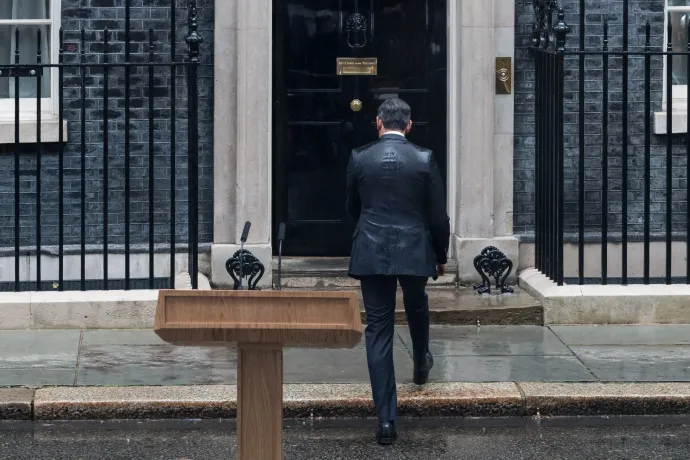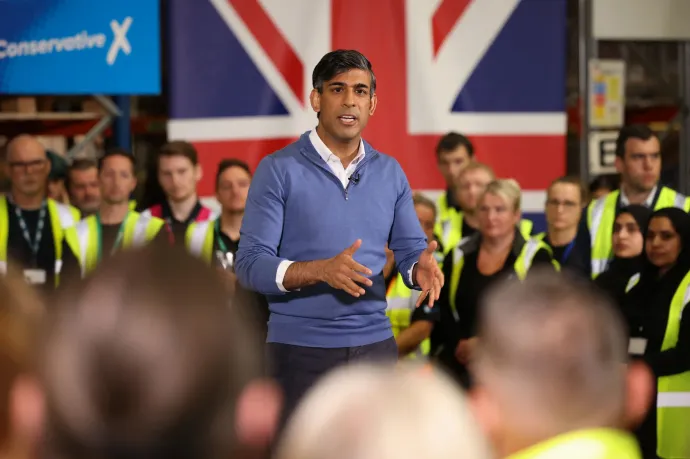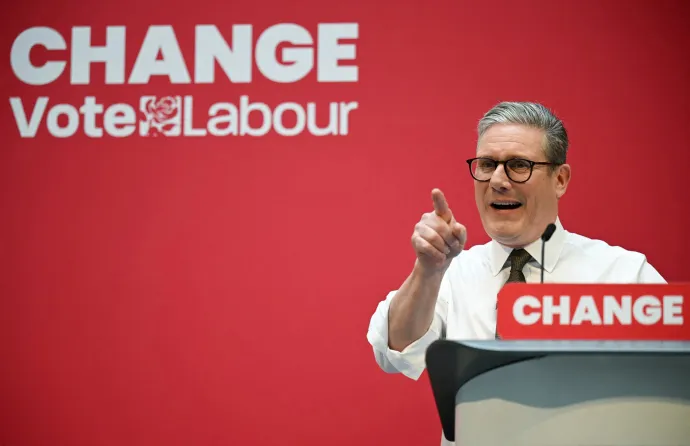Rishi Sunak's Conservatives heading for worst-ever government defeat in British history

As Brits cast their votes on Thursday, the question is not whether Rishi Sunak's Conservatives can stay in power, but whether they are heading for one of the worst or the absolute worst performance a British government has ever had in a general election. Keir Starmer's Labour Party is projected to win around 70 per cent of all seats in the House of Commons. Hundreds of thousands of Hungarians living in the UK will be eagerly waiting for the results, hoping that a Labour government might bring a more relaxed stance on visa rules and work permits for EU citizens.
It's the spring of 2010 and a right-wing party finally unseats the left-wing government which led the country for a long time. This might sound familiar to both British and Hungarian readers.
David Cameron's Conservatives won the 2010 general election in Britain just 11 days after Viktor Orbán's Fidesz party was elected in Hungary. Both parties have been in power ever since, for the past 14 years.
However, while Orbán managed to further solidify his rule in recent years, the Conservative Party has been engulfed in chaos and their rule will almost certainly come to an end by Friday morning.
Labour has been ahead of the Conservatives by around 20 percentage points in the polls published in the weeks before the election. In a poll, published by Ipsos a week before the election, Labour stood at 42 per cent, the Conservatives at 19, Nigel Farage's Reform UK at 15, the Liberal Democrats at 11 and the Green Party at 7.
“It's the Conservatives' lowest ever share in any Ipsos poll, going back to the 1970s, when we've first started doing these polls,” Professor Roger Mortimore, Director of Political Analysis at Ipsos and Professor of Public Opinion and Political Analysis at King's College London, told Telex.
Even though, Labour is projected to only win around 40 per cent of the popular vote, they might secure as much as 70 per cent of all seats in the House of Commons. Ipsos' MRP (multi-level regression and post stratification) model projects that Labour will win around 453 of the 650 seats (251 more than in 2019). Meanwhile, the Tories are projected to win only 115 (250 less than in 2019).
Mortimore noted that the election result might not match the Ipsos MRP projection perfectly, as the research was conducted more than three weeks before the election, which is half of the whole campaign period.
MRP projections published in the days before the election have been even bleaker for Rishi Sunak and the Tories. YouGov projected 102 seats for the Conservatives, while Survation projected only 64.

“It's a completely unprecedented situation. Unless the polls are wrong, the Conservatives are heading for the worst defeat their party has ever had to an inconceivable degree, and the worst defeat any British government has ever had,” Mortimore said.
“Labour will still get an overall majority even if the polls are twice as wrong as they've ever been in history. So that's the depth of the hole the Conservatives are in,” he added.
The MRP projections suggest that high-profile Conservatives such as Chancellor Jeremy Hunt, Leader of the House of Commons Penny Mordaunt, Justice Secretary Alex Chalk and Defence Secretary Grant Shapps are all facing losses, along with a dozen further Tory ministers.
Voters are frustrated with the Conservatives
In Welwyn Garden City, in Shapps' constituency, a half an hour train ride from London, voters are fed up with the Conservative government.
Terry, a 76-year-old retiree told Telex that he had been a Tory voter but he will be voting for Labour at this election. “We've had 14 years of this lot. I mean, the next lot can't be worse,” he said.
“We need change,” his friend, 63-year-old Dan added, who also voted Conservative at the last election but plans to vote for Reform UK this time.
Even those voters are frustrated with the government who are sticking with the Tories. “I'm not happy with the Conservatives. They have done so many bad things in recent years. They are not to be trusted,” 78-year-old Penny told Telex. “I'm going to vote only in the hope that I can keep Labour out. That's my only reason for voting Conservative,” she added.
Labour wants a closer partnership with Europe
If polls and MRP projections are to be trusted, Labour will have a sizeable majority come Friday morning and Keir Starmer will become the next Prime Minister of the United Kingdom.
There are plenty of question marks around what we can expect in the first month of a Labour government. But what is certain to change with Labour in power is the British government's attitude towards the European Union, even as Starmer declared the day before the election that the UK would not rejoin the EU in his lifetime.
“I think that the tone will change dramatically,” Professor Anand Menon, a leading expert in British-European relations and director of the UK in a Changing Europe academic think tank, told Telex. Menon believes that Labour wants a closer partnership with the EU and Starmer wants the UK to be a leader in Europe again.
“That's a very, very different rhetoric to what we've heard under the premiership of Rishi Sunak, let alone Boris Johnson,” Menon said.

“In substantive terms, I think we'll see a lot more coordination,” he added. “I think the UK will try and sign a foreign policy deal that leads to a lot more interaction with the Europeans. It's also possible, that the Labour Party will tinker with the economic deal Britain has with the European Union,” Menon said.
A friendlier relationship with Europe will most certainly be welcomed by the more than 170.000 Hungarians living in the UK, who will be hoping for a more relaxed stance on visa rules and work permits for EU citizens from the Labour Party.
There is one issue though, that Starmer is not planning to change. “There's absolutely no difference between the Labour and Conservative position on supporting Ukraine,” Menon said. “While it's a genuine stance, it's also beneficial for Starmer politically, as being close to the Conservatives on Ukraine is a useful way of signalling that the Corbyn era is over in the Labour Party,” he added.